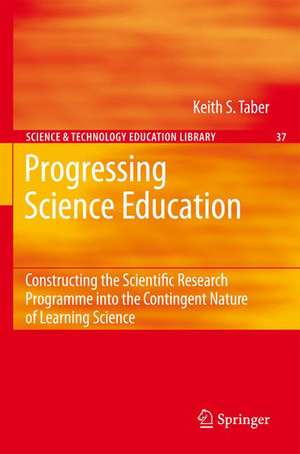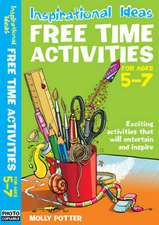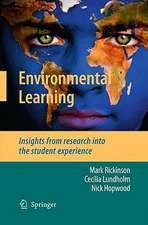Progressing Science Education: Constructing the Scientific Research Programme into the Contingent Nature of Learning Science: Contemporary Trends and Issues in Science Education, cartea 37
Autor Keith S. Taberen Limba Engleză Hardback – 9 iun 2009
Many students find learning science extremely problematic, whatever level of education they have reached. At the end of the 1970s a new approach to tackling learning difficulties in science was developed, drawing on ideas from psychology and cognitive science, and centred on the way students build up new knowledge in reference to their existing ideas. ‘Constructivism’ became the dominant paradigm in science education research for two decades, spawning a vast body of literature reporting aspects of learners’ ideas in different science topics. However, Constructivism came under fire as it was recognised that the research did not offer immediate and simple prescriptions for effective science teaching. The whole approach was widely criticised, in particular by those who saw it as having ‘anti-science’ leanings.
In this book, the notion of scientific research programmes is used to understand the development, limitations and potential of constructivism. It is shown that constructivist work in science education fits into a coherent programme exploring the contingencies of learning science. The author goes further to address criticisms of constructivism; evaluate progress in the field; and suggest directions for future research. It is concluded that constructivism has provided the foundations for a progressive research programme that continues to guide enquiry into learning and teaching science.
| Toate formatele și edițiile | Preț | Express |
|---|---|---|
| Paperback (1) | 950.33 lei 6-8 săpt. | |
| SPRINGER NETHERLANDS – 28 oct 2010 | 950.33 lei 6-8 săpt. | |
| Hardback (1) | 956.50 lei 6-8 săpt. | |
| SPRINGER NETHERLANDS – 9 iun 2009 | 956.50 lei 6-8 săpt. |
Din seria Contemporary Trends and Issues in Science Education
- 20%
 Preț: 568.91 lei
Preț: 568.91 lei - 20%
 Preț: 814.76 lei
Preț: 814.76 lei - 18%
 Preț: 951.77 lei
Preț: 951.77 lei - 15%
 Preț: 638.43 lei
Preț: 638.43 lei - 15%
 Preț: 636.80 lei
Preț: 636.80 lei - 15%
 Preț: 628.08 lei
Preț: 628.08 lei - 15%
 Preț: 637.46 lei
Preț: 637.46 lei - 18%
 Preț: 951.29 lei
Preț: 951.29 lei - 15%
 Preț: 644.95 lei
Preț: 644.95 lei - 18%
 Preț: 951.91 lei
Preț: 951.91 lei - 18%
 Preț: 1218.66 lei
Preț: 1218.66 lei - 18%
 Preț: 953.65 lei
Preț: 953.65 lei - 15%
 Preț: 641.71 lei
Preț: 641.71 lei - 15%
 Preț: 697.15 lei
Preț: 697.15 lei - 15%
 Preț: 644.18 lei
Preț: 644.18 lei - 15%
 Preț: 640.55 lei
Preț: 640.55 lei - 15%
 Preț: 640.06 lei
Preț: 640.06 lei - 15%
 Preț: 639.08 lei
Preț: 639.08 lei - 18%
 Preț: 1388.68 lei
Preț: 1388.68 lei -
 Preț: 389.31 lei
Preț: 389.31 lei - 15%
 Preț: 465.66 lei
Preț: 465.66 lei - 18%
 Preț: 1832.08 lei
Preț: 1832.08 lei - 15%
 Preț: 641.85 lei
Preț: 641.85 lei -
 Preț: 398.15 lei
Preț: 398.15 lei - 15%
 Preț: 644.18 lei
Preț: 644.18 lei - 18%
 Preț: 945.47 lei
Preț: 945.47 lei - 15%
 Preț: 644.30 lei
Preț: 644.30 lei - 18%
 Preț: 1215.04 lei
Preț: 1215.04 lei
Preț: 956.50 lei
Preț vechi: 1166.47 lei
-18% Nou
Puncte Express: 1435
Preț estimativ în valută:
183.02€ • 191.09$ • 151.48£
183.02€ • 191.09$ • 151.48£
Carte tipărită la comandă
Livrare economică 04-18 aprilie
Preluare comenzi: 021 569.72.76
Specificații
ISBN-13: 9789048124305
ISBN-10: 9048124301
Pagini: 420
Ilustrații: XVIII, 400 p.
Dimensiuni: 155 x 234 x 33 mm
Greutate: 0.76 kg
Ediția:2009
Editura: SPRINGER NETHERLANDS
Colecția Springer
Seria Contemporary Trends and Issues in Science Education
Locul publicării:Dordrecht, Netherlands
ISBN-10: 9048124301
Pagini: 420
Ilustrații: XVIII, 400 p.
Dimensiuni: 155 x 234 x 33 mm
Greutate: 0.76 kg
Ediția:2009
Editura: SPRINGER NETHERLANDS
Colecția Springer
Seria Contemporary Trends and Issues in Science Education
Locul publicării:Dordrecht, Netherlands
Public țintă
ResearchCuprins
Science Education As a Research Field Within a Domain of Enquiry.- ‘Scientific’ Research in Education.- A Model of Science: Lakatos and Scientific Research Programmes.- A Scientific Research Programme Within Science Education.- The Negative Heuristic and Criticisms of Constructivism in Science Education.- Building the Protective Belt of the Progressive Research Programme.- The Positive Heuristic: Directions for Progressing the Field.- Final Thoughts: Is There Really a RP, and Does It Matter?.
Recenzii
From the reviews:
“In Progressing Science Education, Keith Taber argues that constructivism is in good health, that its researchers’ shared assumptions of how learning is perceived to occur have been unassailable to date, and that continued new findings and refinement of theory warrant its continuation. … For the new researcher, those who teach researchers, and those who wish to find contexts and support for their own research, this densely written and highly indexed review of research in Science Education provides a resource … .” (Kirk Dorion, Teacher Development, Vol. 14 (4), November, 2010)
“Progressing Science Education … examines broadly conceptual change and constructivist developments. … Taber has produced a book that captures an important phase of research in science education (conceptual change) in a place (England) and time (1978-1983) where he and others forged their skills and developed assumptions. The book provides a good overview of research on science learning and thus would be a valuable read for new entrants to science education research.” (Richard Duschl, Science and Education, November, 2011)
“Taber has produced a book that captures an important phase of research in science education (conceptual change) in a place (England) and time (1978-1983) where he and others forged their skills and developed assumptions. The book provides a good overview of research on science learning and thus would be a valuable read for new entrants to science education research.” (Richard A. Duschl, International History, Philosophy and Science Teaching Group Newsletter, September, 2011)
“In Progressing Science Education, Keith Taber provides a comprehensive defence of constructivism. He argues that how scientists work within constructivist research into science education may be different from natural science enquiry … This densely written, highly structured, copiously referenced and exhaustivelyindexed book requires application and dedication from the reader for full appreciation. However, as a resource for researchers this volume will challenge and support their work for years to come.” (Chris Fraser, Education in the North, Vol. 19, 2012)
“In Progressing Science Education, Keith Taber argues that constructivism is in good health, that its researchers’ shared assumptions of how learning is perceived to occur have been unassailable to date, and that continued new findings and refinement of theory warrant its continuation. … For the new researcher, those who teach researchers, and those who wish to find contexts and support for their own research, this densely written and highly indexed review of research in Science Education provides a resource … .” (Kirk Dorion, Teacher Development, Vol. 14 (4), November, 2010)
“Progressing Science Education … examines broadly conceptual change and constructivist developments. … Taber has produced a book that captures an important phase of research in science education (conceptual change) in a place (England) and time (1978-1983) where he and others forged their skills and developed assumptions. The book provides a good overview of research on science learning and thus would be a valuable read for new entrants to science education research.” (Richard Duschl, Science and Education, November, 2011)
“Taber has produced a book that captures an important phase of research in science education (conceptual change) in a place (England) and time (1978-1983) where he and others forged their skills and developed assumptions. The book provides a good overview of research on science learning and thus would be a valuable read for new entrants to science education research.” (Richard A. Duschl, International History, Philosophy and Science Teaching Group Newsletter, September, 2011)
“In Progressing Science Education, Keith Taber provides a comprehensive defence of constructivism. He argues that how scientists work within constructivist research into science education may be different from natural science enquiry … This densely written, highly structured, copiously referenced and exhaustivelyindexed book requires application and dedication from the reader for full appreciation. However, as a resource for researchers this volume will challenge and support their work for years to come.” (Chris Fraser, Education in the North, Vol. 19, 2012)
Textul de pe ultima copertă
Exploring one of the central themes in science education theory, this volume examines how science education can be considered as a scientific activity within a broad post-positivist notion of science.
Many students find learning science extremely problematic, whatever level of education they have reached. At the end of the 1970s a new approach to tackling learning difficulties in science was developed, drawing on ideas from psychology and cognitive science, and centred on the way students build up new knowledge in reference to their existing ideas. ‘Constructivism’ became the dominant paradigm in science education research for two decades, spawning a vast body of literature reporting aspects of learners’ ideas in different science topics.
However, Constructivism came under fire as it was recognised that the research did not offer immediate and simple prescriptions for effective science teaching. The whole approach was widely criticised, in particular by those who saw it as having ‘anti-science’ leanings.
In this book, the notion of scientific research programmes is used to understand the development, limitations and potential of constructivism. It is shown that constructivist work in science education fits into a coherent programme exploring the contingencies of learning science. The author goes further to address criticisms of constructivism; evaluate progress in the field; and suggest directions for future research. It is concluded that constructivism has provided the foundations for a progressive research programme that continues to guide enquiry into learning and teaching science.
Many students find learning science extremely problematic, whatever level of education they have reached. At the end of the 1970s a new approach to tackling learning difficulties in science was developed, drawing on ideas from psychology and cognitive science, and centred on the way students build up new knowledge in reference to their existing ideas. ‘Constructivism’ became the dominant paradigm in science education research for two decades, spawning a vast body of literature reporting aspects of learners’ ideas in different science topics.
However, Constructivism came under fire as it was recognised that the research did not offer immediate and simple prescriptions for effective science teaching. The whole approach was widely criticised, in particular by those who saw it as having ‘anti-science’ leanings.
In this book, the notion of scientific research programmes is used to understand the development, limitations and potential of constructivism. It is shown that constructivist work in science education fits into a coherent programme exploring the contingencies of learning science. The author goes further to address criticisms of constructivism; evaluate progress in the field; and suggest directions for future research. It is concluded that constructivism has provided the foundations for a progressive research programme that continues to guide enquiry into learning and teaching science.
Caracteristici
Offers a coherent conceptualisation of the field as a research programme that can both make sense of the existing diverse range of research and offer heuristic direction for future researchers Offers an account of the history, current state and potential of the field Responds to a wide range of criticisms of constructivism in science education Locates science education within a post-positivist model of science Offers heuristic guidance on promising directions for further research













